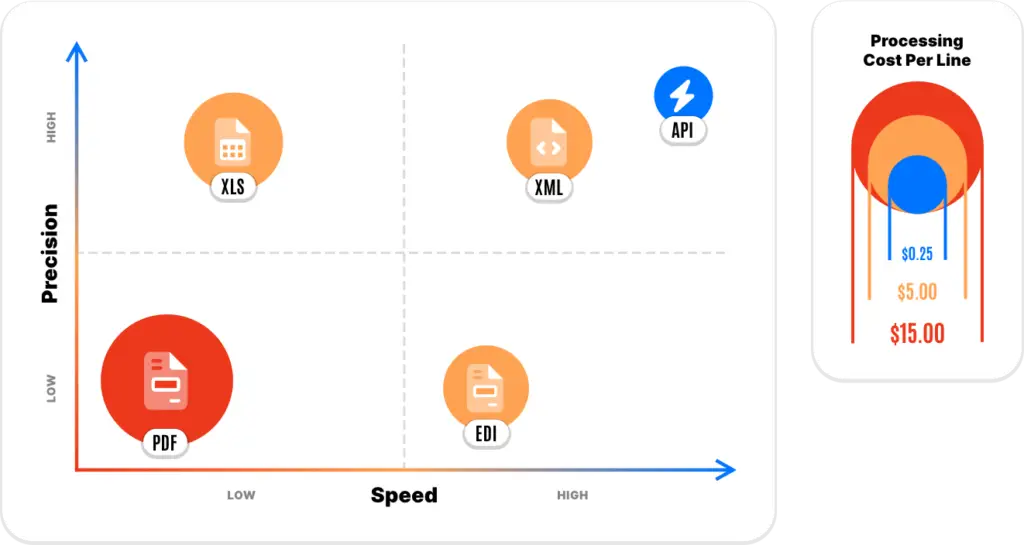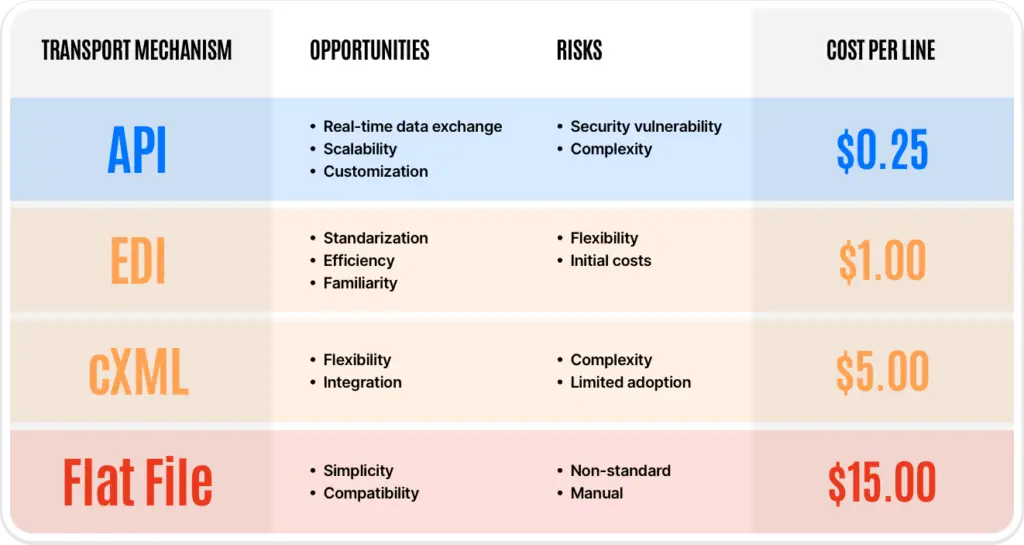Not All Digital Transport Mechanisms are Created Equal
Digital Envelopes of the Procurement Process
In procurement, digital envelopes function as secure containers for data exchange, encapsulating documents such as purchase orders, invoices, and contracts. They ensure that the information transmitted between parties remains confidential and unaltered, providing a digital twin of data with integrity and authenticity.

API (Application Programming Interface)
Opportunities:
- Real-time Data Exchange: APIs facilitate immediate communication between software platforms, enabling businesses to make faster decisions.
- Scalability: They allow for integrating new features and services without disrupting the existing system architecture, supporting business growth.
- Customization: APIs offer the flexibility to tailor data exchange processes to specific business needs, enhancing operational efficiency.
Risks:
- Security Vulnerabilities: If misconfigured during development by an inexperienced technician, APIs can expose systems to security risks if not properly secured, potentially leading to data breaches. Be sure experienced developers enable your APIs.
- Complexity: The development and maintenance of APIs require technical expertise, which can be a barrier for some organizations.
- Automation: More often seen as an opportunity, don’t forget that APIs automate business processes, so a lack of robust validation and alert mechanisms can lead to quickly created errors at a tremendous scale. Again, be sure experienced developers enable your APIs.
Use Cases: Real-time inventory management, dynamic pricing updates, and automated order processing.
EDI (Electronic Data Interchange)
Opportunities:
- Standardization: In theory, EDI follows strict standards, ensuring consistent and error-free document exchange between different systems and businesses. Despite trading partner uniquenesses, it runs smoothly once an integration is established.
- Efficiency: It automates the data exchange process, reducing manual intervention and speeding up transaction cycles.
- Familiarity: EDI, in its ANSI X12 and EDIFACT varieties, is a decades-old protocol.
Risks:
- Flexibility: The EDI standards allow for flexibility that may not be common across organizations, making it cumbersome to assimilate uniqueness and slowing the integration phase.
- Initial Costs: Setting up an EDI system can be expensive, as specialized software and hardware are required.
- Not Industry Specific: EDI is an open protocol whose standards apply to everything from t-shirts to liquids shipped by rail car to purchasing educational services. Participants sometimes get lost in the definitions of data elements and what does or does not apply to them.
Use Cases: Purchase order and invoice processing, shipping notices, and payment transactions.
cXML (Commerce XML)
Opportunities:
- Flexibility: cXML supports many document types and is less rigid than EDI, allowing for easier customization.
- Integration: It can be easily integrated with existing XML frameworks, facilitating smoother data interchange.
Risks:
- Complexity: The flexibility of cXML comes with increased complexity in setup and maintenance.
- Limited Adoption: Its use is less widespread than EDI, potentially leading to compatibility issues with some trading partners.
Use Cases: Catalog updates, order management, and direct procurement transactions.
Flat File
Opportunities:
- Simplicity: Flat files are easy to create and understand, requiring no specific software for basic operations.
- Compatibility: They can be used across various systems without the need for complex integration.
Risks:
- Lack of Standardization: Without a standard format, data interpretation can vary, leading to errors and inconsistencies.
- Manual Processing: Using flat files often involves manual data entry, which is time-consuming and prone to errors.
Use Cases: Simple data storage, small-scale data exchange, small catalog exchange or updates, and situations where compatibility is a priority.

Comparing the Current State to the Future State
Currently, many businesses rely on EDI and flat files for document exchange. While these methods have facilitated digital transactions for decades, they have limitations such as rigidity, high setup costs, and manual processing. These limitations can impact business operations, slowing down transactions and introducing errors.
The future state leans towards API-driven exchanges, which promise real-time data transfer, scalability, and customization. The business impact of APIs includes increased efficiency, improved decision-making capabilities, and enhanced customer satisfaction. However, challenges such as security vulnerabilities and the complexity of API integration present obstacles to widespread adoption.
When migrating from legacy processing technologies, processing costs are expected to be reduced by the order of 100x, or from $25 to $0.25 per line in some instances.
Read a case study where Sonic Manufacturing was able to reap the benefits of process automation (https://www.orbweaver.com/case-study/sonic-manufacturing/)
Challenges in Migrating to the Future State
Migrating to an API-centric document exchange framework involves overcoming technical, financial, and operational hurdles. Organizations must invest in cybersecurity measures to protect against data breaches, provide staff training, and possibly overhaul existing systems to accommodate new technologies.
To date, the potential reduction in processing costs has been well known. However, the high fixed costs of migrating to more advanced technical solutions, education, and capabilities have acted as barriers to entry to capture these savings. Companies like Orbweaver are lowering these fixed migration costs, allowing organizations to effectively capture a return on investment.
Conclusion
It’s somewhat reductive to pick a winner or even strictly choose one method or another. For those involved in buying or selling electronic components, the best path to success is to be flexible and support whatever method your partner wants. Flexibility can come at a cost when trying to support these diverse methods. That’s where the Orbweaver DataHub platform comes in. DataHub can act as a data exchange that can take in any of the formats we’ve discussed, normalize them to a standard schema, and export them to any other. This way, no one has to change their business process or commit to just one method.
